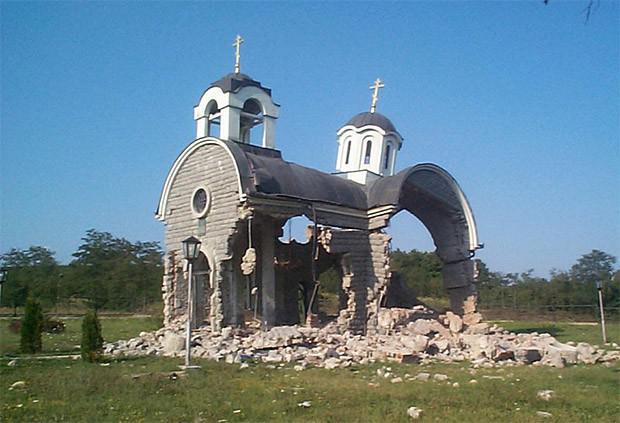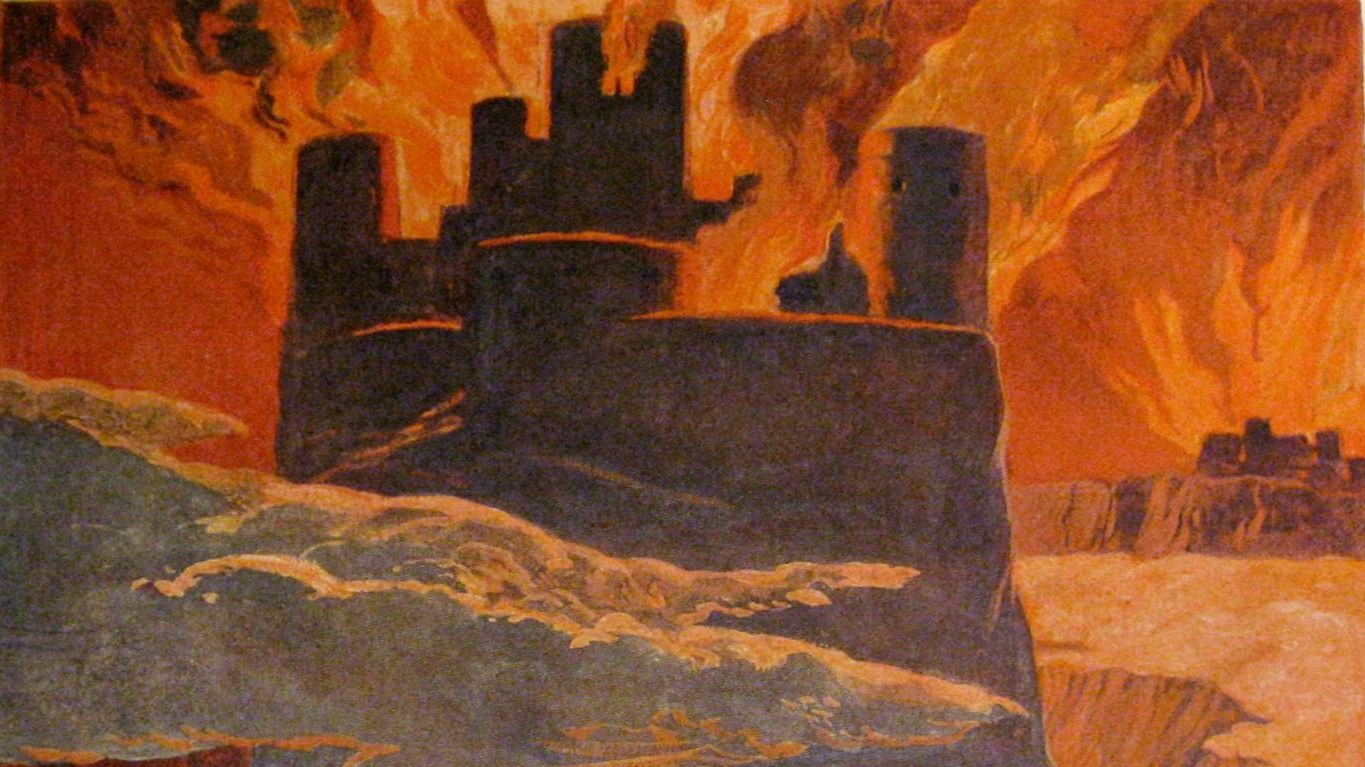Creating statements that can be interpreted in different ways is one of the main know-hows of postmodernists, who develop the conceptual warfare.
What happened in Ukraine was an anti-constitutional and anti-democratic coup, orchestrated from without, audaciously and actively supported by the West in general and the USA in particular. And if this riot is to be called a “revolution” then this is a “revolution of a banana republic”, that is to say, a coup that a colonizer organizes on the controlled territory which lacks actual sovereignty.
So, “banana republics”, coups. Stop. All of this should be discussed – and will be discussed – in the Political warfare section. It will not do to mix the sections. Then, what ought to be discussed in the Conceptual warfare section? Definitely, interpretations. That is to say, those conceptual tools, which are used to defend, justify (“legitimize”) those same “revolutions of banana republics”. The way these tools were created and their development in the XX and XXI century. So, let us discuss it.
But first, let me add a few words about “revolutions of banana republics” like the one in Ukraine.
The “banana republic” technology has been used and honed for a long time, first by Britain and then by USA. The British hegemony in Asia and American rule in South and Central America as early as mid-to-late XIX century was, effectively, almost completely based on such technologies.
But in those days it was so much easier to do. And conceptual finery was not is such demand. Why use finery when you can bring your warships to the shores of a weaker country (it was called the “gunboat diplomacy”), shoot down the noncompliant authorities by cannons, and carry out the other components of the political war. Such as directly financing and sending “revolutionary armies” to the recalcitrant state territory, striking secret deals with the local elite, which were backed by large sums publicly approved by the parliament for “the support of friendly forces” and “defending national economic interests”. It was the American policy of this kind towards her southern neighbors, where one of the main tools was allegedly defending the economic interests of the United Fruit Company which led to the term “banana wars” applied to this type of “revolutions”.
Conceptual finery, or interpretations, proved necessary after the World War II and the creation of the UN, when it turned out that “gunboat diplomacy” needed to be heavily revised. Why?
Above all, because USSR as a leader of the Soviet bloc loudly announced itself as the opposing global actor. Soviet Union not only demonstrated the economic, technological, and military resources adequate for such confrontation but also gained great political influence in the UN and its Security Council, the global body that controls over the compliance of the UN member states with the international legal obligations.
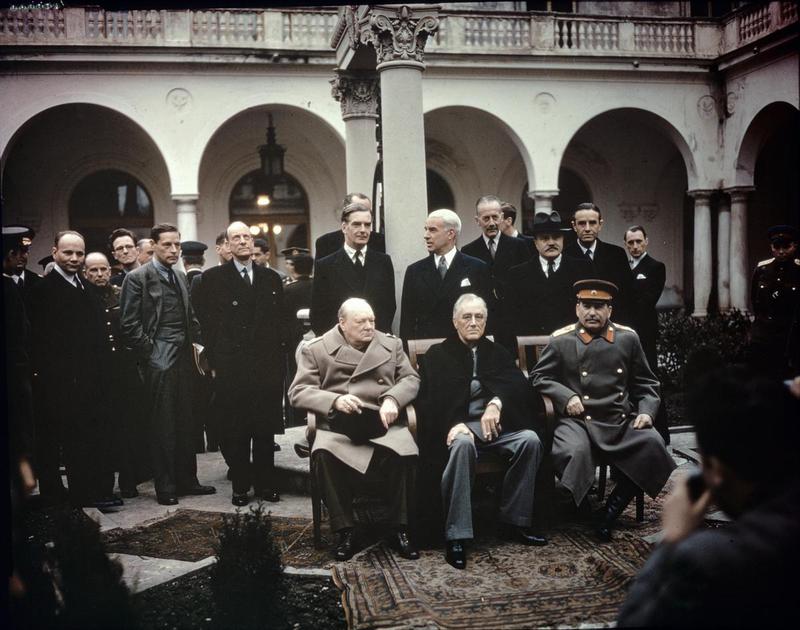
During the whole post-war period American attempts at “revolutions of banana republics” using old, time-tested scenarios met with the Soviet opposition, from the UNSC level to “indirect” force. It happened in Korea, Vietnam, Angola, Cuba, etc.
And that’s where the USA started to employ the conceptual warfare, otherwise known as active development of new channels for those same “revolutions of banana republics” to seep into the world. They have been engaged in it in a particularly active manner since the 1960’s.
The international legislation in the part concerning the so-called “human rights” and “rights of nations” became the main channel of the new conceptual warfare model. What the Soviet party was thinking while the Americans were doing all that in the UN and other international platforms is unclear. Apparently, the Soviet party was concerned with the welfare of the Soviet people and USSR’s nuclear missile capabilities.
We know how it ended. The Communist Party of the Soviet Union managed to create outstanding nuclear weapons. And collapsed. But if they managed to create just as outstanding informational and interpretational weapons, that would prove impossible. And we would live in a very different and great country.
Let us learn this lesson and take a closer look at how the Americans went about creating the conceptual weaponry that would destroy USSR.
In 1966 the UN adopted the International Covenant on Civil and Political Rights and International Covenant on Economic, Social and Cultural Rights. These documents included a certain list of human rights as an international standard. Which was recommended – only recommended at that point – to be incorporated into the national legislature.
The list included, in particular, freedom of conscience (the right to any beliefs or ideas), freedom of the press (prohibition of censorship), freedom of assembly, freedom of association, freedom of science and the arts, and academic freedom.
However, every single one of these freedoms allowed for one more “freedom”, freedom of various interpretations. For instance, can we prohibit teaching of ideological basis for Nazism or a “party of cannibals” or not? And the vagueness of such interpretations offers great potential for the political game.
Also those covenants of 1966 stated, that, “All peoples have the right of self-determination. By virtue of that right they freely determine their political status and freely pursue their economic, social and cultural development… The States Parties to the present Covenant… shall promote the realization of the right of self-determination, and shall respect that right, in conformity with the provisions of the Charter of the United Nations.”
As I have written before, creating “statements” that can be interpreted in different ways is one of the main know-hows of postmodernists, who develop weapons for conceptual warfare. We introduce something open for interpretation and then achieve the victory of our own interpretation – that is the strategy of the enemy waging this war.
The principle introduced in 1966 allowed for an extremely wide range of interpretations. Because, first, the principle of right of self-determination immediately came into conflict with the general principles of the UN Charter – territorial integrity of the state and inviolability of its borders. Secondly, there has never been a universally accepted definition of a people, a nation, or an ethnos in the international law. That essentially allowed for any group of people to declare themselves a “nation” and on that basis alone to demand anything, from autonomy to self-determination, up to secession.
Let us agree, that such a shift in international law was a very significant conceptual move prepared in advance. Simply because afterwards those who had prevalent interpretation potential could slowly get their hands on the main “keys” to the international politics. Namely the potential of “authoritative expertise” and, most importantly, the power of the “authoritative media”, which would convey the necessary interpretations of any real (or imaginary, it did not matter anymore) events to virtually everyone on Earth according to the wishes of their masters. Of course, the world system of the most powerful and the most authoritative media and later, the World Wide Web has been ultimately created by the USA for this purpose.
But at the time nobody dared to seriously question the priority of the main legal principle of the UN – the principle of state sovereignty, as well as the resulting principle of the primacy of the national constitutional law over any external law.
Everything started to change, and change rapidly in the late Soviet and post-Soviet period.
As early as 1989-1991, during the disintegration of the “Soviet bloc” three Conferences on the Human Dimension of the founded in 1973 Conference on Security and Co-operation in Europe (CSCE) took place. The Document of the Moscow Meeting of the Conferences on the Human Dimension of the CSCE in 1991 stated that “issues relating to human rights, fundamental freedoms, democracy and the rule of law are of international concern… and do not belong exclusively to the internal affairs of the State concerned”. Note, that it is from that point that these “military” concepts, we have been discussing all this time, started to appear, be interpreted, and aggressively imposed. And also – to be linked with the new self-proclaimed “military” authority of the international organizations.
In 1992 during the Summit in Helsinki CSCE claimed its authority to take practical measures “to prevent, manage and settle conflicts” on local and regional level. From that moment on CSCE got more and more actively involved in the conflicts in Yugoslavia and on the territories of the former Soviet republics.
Later the process of introducing – through various means, including the UN, CSCE (renamed in 1995 to Organization for Security and Co-operation in Europe, OSCE), the European Council, etc., – other provisions that allowed different interpretations started. One of them was the provision about the “unjustifiable and excessive use of force by the state authorities”, another was the system of regulations allowing placing the assessment of the legitimacy of election procedure in direct dependence on its interpretation by non-elected “international observers.”
Thus, more and more possibilities of using such postmodernist “interpretation” technologies were introduced into the key legal regulation framework of the international peace and security. And it stopped being a purely philosophical problem but became a highly political issue instead. Since it were the interpretations of both “constantly updated” international law and the world events that became the fertile ground that spawned the so-called “policy of double standards”.
Already, during the “revolutions of banana republics” in the Baltic region and the dissolution of the USSR (simultaneously with the dissolution of Yugoslavia) there was a choral outcry about the “right of nations to self-determination”. Then the same mechanism started to be more and more widely used everywhere. Amidst the genocide of Serbs in Croatia, supported by the contingent of the UN “peacekeepers” — as a justification of the ethnic cleansing of Serbs in the Croatian territories; amidst the civil war in Tajikistan — as a justification of the radical Islamic terror against the recalcitrant population.
And then, as they say, “from China to Peru”. In Chechnya, in Somalia, in Indonesia and so forth. Besides, virtually every time the actions of the legitimate authority to protect its sovereignty, its territorial integrity and to defend the rule of law were proclaimed as “violation of human rights and freedoms”, “unjustifiable and excessive use of force”, and “crimes against right of nations to self-determination”. At the same time, the actions of every, even the most low-life bandits and terrorists were called “the realization of the people’s sacred right to rebel against the criminal authorities abrogating human freedoms and rights”. Notably, there was always a corresponding (often crudely or skillfully falsified) “picture”, necessary “eyewitness accounts” and “analytical findings”.
Especially audacious, demonstrative and, in a way, “model” example of such approach was the use of the “policy of double standards” in Kosovo in 1999. In this conflict Europe (most notably Germany) and the USA fervently wished to humiliate and weaken Serbia both as the only country in the Balkans that showed real and powerful defiance to the Nazi invasion, and as the only “stubborn”, still pro-Russian enclave in the region.
For this purpose, “idea-driven” Kosovo nationalists like Ibrahim Rugova were excluded from the American support system for being too civilized and were marginalized from the mainstream political process. Instead the money was put on Kosovar thugs and drug barons like Hashim Thaçi, Adem Demaçi, Agim Çeku, etc.
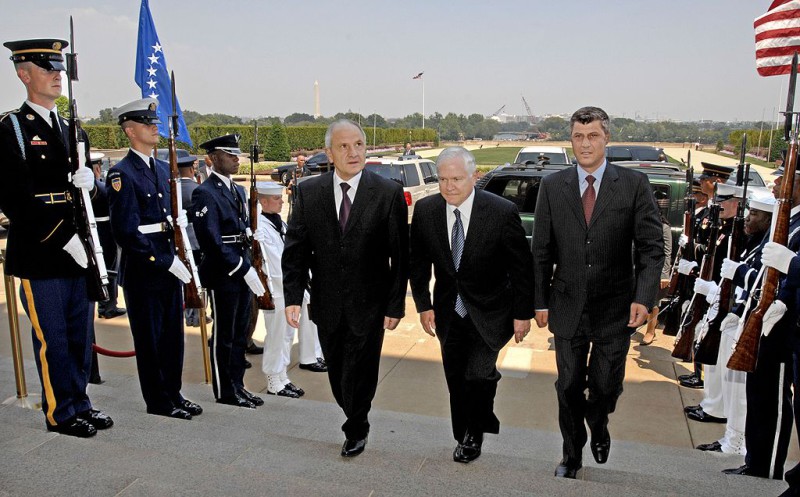
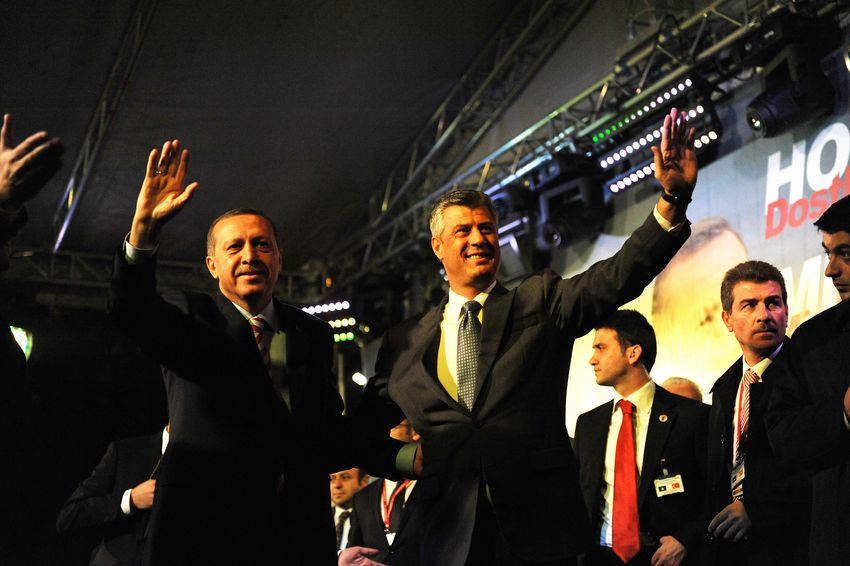
The demand was for Serbia to “strictly follow the democratic procedures” and “not to use force against the people craving for national self-determination”. Kosovars were allowed to use any criminal methods during their “self-determination”. The whole informational and disinformational apparatus of the Alliance was set up to creating the necessary “picture”. Systematic (financial, political, informational, military) support of Kosovo’s thugs ended with a large-scale military operation of NATO against Serbia and led to the emergence of the “semi-recognized” Republic of Kosovo.
Serbia was brought to its knees for a long time. Europe got a real pain in the neck both in expenses needed to maintain minimal order in the criminal “quasi-state” of Kosovo, and in extensive infiltration of Kosovar organized crime into the European and transnational criminal networks. And USA soon won the grand prize in Kosovo – Bondsteel, the largest military base in Europe, the use of which is not confined to purely military purposes. According to experts, Bondsteel is the main transit point for the flow of drugs from Afghanistan to Europe (and everywhere else from there): no less than 40% of Afghan heroin gets into Europe through this base.
In that same year of 1999 NATO Washington Summit also included several Eastern European States into their membership at once and adopted one, notably fundamental, international legal innovation. The Summit declared the possibility of the defense of Allies interests “outside home territory when required”. In other words, it basically declared virtually the whole world to be its area of responsibility.
Source (for copy): https://eu.eot.su/?p=4817
This is the translation of the first article (first published in “Essence of Time” newspaper issue 66 on February 26, 2014) by Yury Byaly on how double standards and various conceptual means of interpretation allow the United States to establish in foreign countries the governments it needs.

